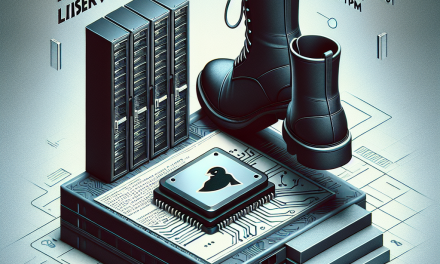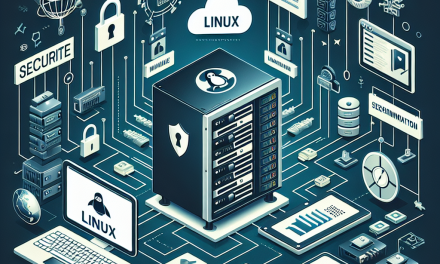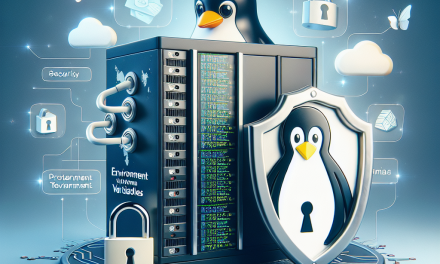In the world of Linux server administration, maintaining the integrity of scheduled tasks is crucial for ensuring system stability and security. Cron jobs are a powerful tool, providing automation for routine tasks, whether they’re backups, updates, or log rotations. However, they can also be a target for malicious actors aiming to compromise a system. In this article, we’ll explore best practices for detecting cron job tampering and how to safeguard your Linux servers.
What is Cron and Why is it Important?
Cron is a time-based job scheduler in Unix-like operating systems. It allows users to execute scripts or commands at specified intervals (minutes, hours, days, weeks, etc.). Given its ability to carry out automated tasks, cron can be a double-edged sword—it can increase efficiency but also introduce a point of vulnerability if not properly secured.
Why Detecting Tampering is Vital
Tampering with cron jobs can lead to serious consequences:
- Data Breach: Unauthorized cron jobs can reveal sensitive information or exfiltrate data.
- Malware Installation: Attackers may set up jobs to install malware or maintain persistence.
- Denial of Service: Malicious cron jobs can overload server resources or disrupt normal operations.
Therefore, proactively detecting and mitigating any tampering is essential for maintaining security.
Best Practices for Detecting Cron Job Tampering
1. Regular Audits of Cron Jobs
Performing regular audits of your cron jobs is a foundational practice. You can do this by:
-
Listing Current Cron Jobs: Use the command below to view user-specific and system-wide cron jobs.
bash
crontab -l
sudo cat /etc/crontab
sudo ls /etc/cron.d/ -
Comparing Against a Baseline: Keep a secure record of known good cron jobs. Use tools such as
diffto compare current jobs against this baseline.
2. Log Cron Job Execution
Logging cron job executions is essential for tracking their activity. You can enable logging in the system’s syslog by adding the following line in the /etc/rsyslog.conf file:
plaintext
cron.* /var/log/cron.log
Make sure to review these logs regularly for unusual activities or job executions at unexpected times.
3. File Integrity Monitoring
Utilizing file integrity monitoring tools can help detect unauthorized changes to cron job configurations. Tools like AIDE (Advanced Intrusion Detection Environment) or OSSEC can monitor file changes in /var/spool/cron, /etc/crontab, and /etc/cron.d/. Here’s how to set up AIDE to monitor cron files:
-
Install AIDE:
bash
sudo apt-get install aide -
Initialize AIDE Database:
bash
sudo aideinit -
Check for Changes:
bash
sudo aide -c /etc/aide/aide.conf –check
4. Restrict Cron Job Permissions
Limit access to cron job configurations. Only allow necessary users to create or modify cron jobs. Use the following command to edit crontab permissions:
bash
sudo visudo
Restrict access by specifying who can or cannot access the crontab:
plaintext
john ALL=(ALL) NOPASSWD: /bin/false
5. Use Shellcheck for Scripts
If your cron jobs execute scripts, use tools like Shellcheck to analyze them for potential security issues or anomalies. You can install Shellcheck using:
bash
sudo apt-get install shellcheck
Example:
bash
shellcheck your_script.sh
6. Employ Intrusion Detection Systems (IDS)
An IDS can bring added visibility into potential unauthorized access or changes to your system, including cron jobs. Tools like Snort or Suricata can help detect malicious activity.
7. Implement Access Controls
Using tools like AppArmor or SELinux can help enforce security policies that limit the actions that scripts run by cron can perform. This adds an additional layer of protection.
8. Educate Your Team
Ensure that everyone involved in server management is aware of best practices for cron job security. Regular training sessions can provide insights into the latest threats and preventive measures.
Conclusion
Cron jobs are a powerful feature in Linux systems that can add great efficiency but also pose significant security risks when left unmonitored. By implementing regular audits, logging, file integrity monitoring, and other best practices, you can significantly reduce the risk of cron job tampering on your Linux servers. In the evolving landscape of cyber threats, staying vigilant is paramount. Protect your systems, automate responsibly, and keep your Linux servers safe from potential tampering.
For more tutorials and insights into enhancing your Linux security, keep following the WafaTech Blog!





